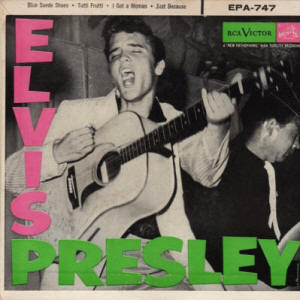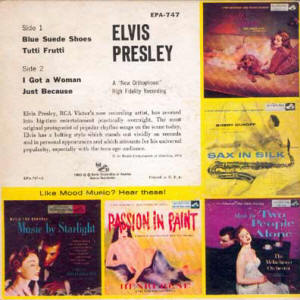Verdict
All songs are cover versions, but the artist manages to present them in his own, unique style.
![]()
(C) RCA Victor
The ultimate site about the king of the analogue age


Simultaneously with the long player "Elvis Presley" RCA Victor also released an extended player and a double extended player of the same name. With "Blue Suede Shoes" selected as core track by Billboard the ep peaked at number 24 on the "Most Played By Disc Jockeys Chart" and at number 20 on the "Best Sellers In Stores Chart". After Billboard had created a separate chart for this format, "Elvis Presley" entered the "Best Selling Pop EPs Chart" on May 26, 1958, stayed for two weeks and peaked at number 6. In total RCA Victor sold a million copies of this extended player which was honored by the RIAA with a Gold Award in 1992. The equivalent of the physical sales are 150 million paid streams of the ep or 600 million paid streams of individual tracks.
The ep is not available on the streaming platforms since all tracks can be found on the album "Elvis Presley" (1956). In 2016 the complete Presley catalogue was restored and remastered by Vic Anesini for a boxed set of 60 compact discs called "The Album Collection". Sony Music Entertainment provides the streaming platforms with the same versions of the individual albums (in some cases with bonus tracks), albeit in 24 bit/90 khz flac. That means, if the platform of your choice supports high resolution audio, you can enjoy the tracks in the same quality Sony used to scan and master them.
To create the best recognition value possible, RCA Victor copied the name and artwork of the album. The back cover was different, in this case the label used it to promote other contracted artists.
Blue Suede Shoes
The song is based on an occurrence Johnny Cash had witnessed while on military service in Landsberg Am Lech/Germany. His supervisor always used to say "don't step on my blue suede shoes" when he wanted to point out one should not challenge him. Cash told the story to Carl Perkins and when he saw a dancing couple with the man keeping the lady at distance to avoid she was stepping on his shoes, he mixed the incidents and turned them into a song. He called the result "Blue Suede Shoes" and released it on January 1, 1956 on a single. Because Elvis liked the song and had performed it on television Steve Sholes pressed him to record it in the studio. The young singer gave in and put the song on tape on January 30, 1956 within ten takes. Sholes planned to release the song on a single and use the market power of RCA Victor to entice the hit away from Carl. It is said that Elvis opposed and the track was used on the album only. However, in August 1956 "Blue Suede Shoes" was issued on a single with "Tutti Frutti", another cover version of a recent hit. Elvis re-recorded "Blue Suede Shoes" in 1960 for the movie "G.I. Blues", but this time in a much tamer arrangement. Live versions can be found on "From Memphis To Vegas / From Vegas To Memphis" (1969) and "Aloha From Hawaii Via Satellite" (1973). Another recording, this time made in 1968 for the tv special "SINGER presents Elvis", was featured on "A Legendary Performer - Volume 2" (1976). It's safe to say that Elvis never even came close to his great original recording.
Tutti FruttiIn early January of 1956 Little Richard had scored a number 2 hit with "Tutti Frutti" on the "Rhythm & Blues Chart", on the 31st of the same month Elvis recorded his variation of the tune. While the original artist had nailed the song within three takes Elvis needed ten attempts to get it right. Little Richard had written the funny song about the qualities of his female acquaintances himself, but his producer Robert Blackwell regarded the lyrics too raunchy and had Dorothy LaBostirie adjusting them.
I Got A WomanRay Charles had stormed the R&B-Charts in 1955 with a song called "I've Got A Woman" and a very young Elvis had included it in his live show almost immediately. The song was based on the gospel "It Must Be Jesus" and was written by Renald Richard and Ray Charles. The Hillbilly Cat recorded it on January 10, 1956 at the RCA Studio in Nashville/Tennessee and needed eight takes to do so.
Just BecauseIn the song his girlfriend regards herself something better, so the singer decides to leave her. In the 1970s Elvis would have presented such a story in form of a mourning country ballad, but here he doesn't even appear to be sad. Elvis' version was recorded on September 10, 1954 at SUN Records. "Just Because" was written by Sydney Robin and first released in 1929 by Nelstone's Hawaiians.
All songs are cover versions, but the artist manages to present them in his own, unique style.
![]()
(C) RCA Victor